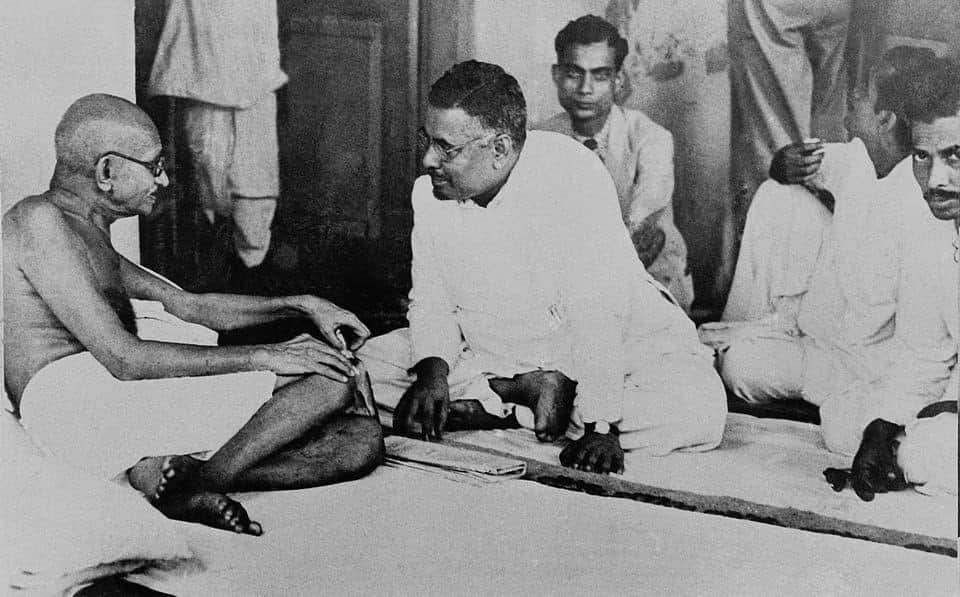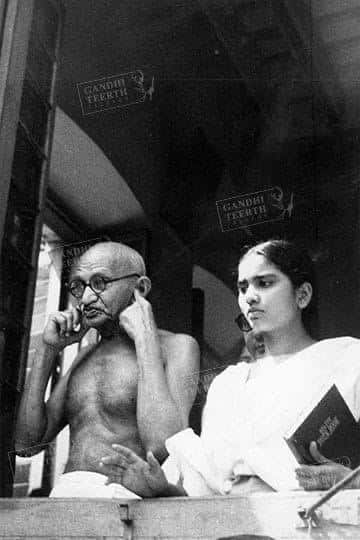



Kolkata: Repairs are in full swing at Kolkata’s Gandhi Bhavan or the Hyderi Manzil, a 19th century building that became the site of important historical events soon after India gained Independence 75 years ago.
The single-storeyed building has eight rooms, and is surrounded by a cacophonous market where morning walkers shop for fresh fish and vegetables.
Close by, belching lorries and backfiring trucks clog the Beliaghata road leading to a near-empty Sealdah railway station.
No one knows when the home will reopen to the public.
***
In September 1947, a month after India gained Independence from the British, the place was called Mia Bagan. Manubehn Gandhi had coined the term the Miracle of Calcutta, referring to a series of events that occurred over a 26-day period, and helped the Mahatma rescue Calcutta (now Kolkata) and Bengal from a frenzy of communal violence.
“India was saved, India changed,” says noted social historian Ashish Nandy.
“The building bears witness to a vital chapter of Indian history. Those were the darkest hours in South Asia,” adds Nandy.
Mahatma Gandhi stayed at the Hyderi Manzil on his last visit to Calcutta. He had toured the city at least 64 times from 1896, spending a total of 566 days here.
Many historians claim Gandhi chose to stay in Beliaghata because it witnessed one of the bloodiest riots during the 1946 Calcutta Killings.***
Officials of the Purba Kolkata Gandhi Smarak Samiti, which has been maintaining Hyderi Manzil since the 1950s, say rare photographs of Gandhi in Kolkata are displayed in Gandhi Bhavan. There are objects like the spinning wheel, cap, kharam, pillow and mattress that Gandhi used. Three swords surrendered to Gandhi by rioters are also kept in a glass vitrine.
One of the rooms of this building was cleaned up to house Gandhi, who spent the tumultuous period between August 13 and September 7, 1947, here. Giving him company was the Huseyn Shaheed Suhrawardy, the controversial Muslim League leader who headed the (undivided) Bengal provincial government.
On August 15, 1947, Gandhi spent the day praying and fasting. And it was in this very building that Gandhi fasted for 73 hours until key leaders of the warring groups laid down arms at his feet and swore off communal violence on September 4, 1947.
 Gandhi stayed at Hyderi Manzil on his last visit to Kolkata, to quell the communal violence.
Gandhi stayed at Hyderi Manzil on his last visit to Kolkata, to quell the communal violence.
Ending violence
Speaking to a large gathering at the Ochterlony Monument (now Shaheed Minar) on September 7, 1947, Gandhi had said: “Even if you want to fight, against whom will you fight? Against your own brothers? I request those who have weapons to surrender them. Weapons will not save anyone; God alone is the saviour of all, so seek His protection.”
Gandhi also said: “Let us work with God as witness. Bengal must remain calm, even if the whole of Hindustan is reduced to ashes. It would be wonderful if the Muslims and Parsis are as free to read the Koran and the Zend Avesta as the Hindus in Bengal are to read the Gita, to recite the Gayatri and perform sandhya (aarti).”
Nandy says Gandhi knew the Partition had ravaged Bengal and that it was his moral responsibility to ensure peace in Calcutta on August 15, 1947.
Historians in Kolkata say Gandhi, in an editorial titled "Miracle or Accident" published on the first anniversary of the Great Calcutta Killings, had written about Hindus and Muslims chanting “Jai Hind” in unison.
“We have drunk the poison of mutual hatred, and so this nectar of fraternisation tastes all the sweeter, and the sweetness should never wear out,” Gandhi wrote.
Rajat Ray, former vice chancellor of Visva Bharati University and an historian, says Gandhi’s role in quelling the riots was of immense importance to both Calcutta and Bengal. “It also did wonders for the rest of the country because many watched how Gandhi worked towards ensuring peace in Noakhali and Calcutta,” he says.
Ray says Gandhi's fasting, followed by his peace talks and the eventual withdrawal of rioters was nothing but satyagraha, or soul force.
Former Bengal governor Gopalkrishna Gandhi, the Mahatma's grandson, has previously said that this "soul force" helped his grandfather achieve success against the tyranny of the British, and also against his countrymen. “The Rev. Dr Martin Luther King Jr and Nelson Mandela found this capacity in Gandhi compelling, exemplary and even sublime,” Gopalkrishna Gandhi wrote in a signed op-ed in The New York Times a few years ago.
“Mohandas Gandhi spent weeks in both theaters of what he described as almost a civil war. He was determined to quell sectarian violence with his own life if need be. On Aug. 15, 1947, as India won its freedom and the new nation celebrated its new dawn, Gandhi did not join the celebrations in New Delhi.
“He was in Calcutta, where sectarian riots had disfigured life, even as bloody carnage had left hundreds of Hindus dead in East Bengal and Muslims, likewise, in Bihar. Gandhi described the day as meant for celebration but also for sorrow.”
Wrote Gopalkrishna Gandhi: “Calcutta broke into bloody riots within days of independence. Gandhi fasted against the violence. The men who ransacked his dwelling almost killed him but his courage and lack of fear stayed their hand. Hindu and Muslim rioters cowered before Gandhi’s moral force.”
Hyderi Manzil witnessed everything Gandhi did, including his morning walks with some of his dedicated followers to quell violence.

Tushar Gandhi records
In his blog, Mahatma Gandhi’s great grandson Tushar Gandhi wrote that he vividly remembered Bapu’s role in what was then known as Calcutta.
“Those were troublesome days,” Tushar Gandhi tells Moneycontrol. “The importance of Hyderi Mansion was that Bapu was staying there when India won her Independence. It was here in Independent India Bapu suffered a life-threatening attack by fanatics, and it was here that he fasted for peace in Calcutta (now Kolkata) and Bengal. It was from here he performed what came to be known as the Miracle of Calcutta,” Tushar Gandhi says.
"Gandhi’s faith in the people seemed to be vindicated in Calcutta, where he arrived on August 9, 1947, on his way to Noakhali to resume his peace mission there, intending afterwards to go to Bihar. Here, he found Muslims 'living in terror'. The memory of the “great Calcutta killing” of August 16, 1946, provoked by the Muslim League’s Direct Action Day was rankling in people’s minds. Especially the Hindus, it was reported to Gandhi, had started threatening brutal revenge.
“The secretary of the Calcutta District Muslim League, Mohammad Usman, waited on Gandhi on August 10, accompanied by a large deputation of Muslims. They entreated Bapu to stay on, even if only for two more days: 'We Muslims have as much claim upon you as the Hindus. For you yourself have said you are as much of Muslims as of Hindus.'
“Bapu (said): 'I am willing, but then you have to guarantee the peace of Noakhali. If I do not go to Noakhali before the 15th on the strength of your guarantee and things go wrong there, my life will become forfeit; you will have to face a fast unto death on my part.' The Muslim leaders accepted the condition.
“Late in the evening on the same day, the former Muslim League Premier of Bengal, H.S. Suhrawardy, arrived with his party’s leaders and requested Bapu to prolong his stay in Calcutta indefinitely, till peace was firmly restored. Bapu replied: 'I would remain if you and I are prepared to live together. We shall have to work till every Hindu and Mussalman in Calcutta safely returns to the place where he was before. We shall continue in our effort till our last breath.' He asked Suhrawardy to think carefully before accepting the offer, for this would mean “that the old Suhrawardy” would 'die' and become a fakir.
“Bapu had made this offer to Suhrawardy before leaving for Noakhali in 1946, too. Then, Suhrawardy had laughed him off; this time he accepted and on the evening of August 13 the two moved into an abandoned and dilapidated home, Hydari Mansion, in the predominantly Muslim locality of Beliaghata.
“Bapu wrote to his trusted co-worker Satish Chandra Das Gupta: 'I have taken many risks; perhaps this is the greatest of all.' The Hindus were in an aggressive mood, for they rightly believed Suhrawardy was responsible for the killing on August 16, 1946. Gandhi persisted in the non-violent confrontation. 'You can obstruct my work, even kill me. I won’t invoke the help of the police… What is the use of dubbing me an enemy of the Hindus? How can I, a Hindu by birth, a Hindu by creed and a Hindu of Hindus in my way of living, be an enemy of Hindus?' The opposition was softened somewhat, but not quite. The demonstrations continued, the anger at Suhrawardy directed at Gandhi.
“According to a source, a packed audience listened to Gandhi without the slightest disturbance. He then returned to the reason for postponing his visit to Noakhali. He said that Suhrawardy had come to see him to do his bit to bring peace to Calcutta. He said he had agreed, provided Suhrawardy went with him to the affected areas and stayed there under the same roof with him till the fury had abated and till complete friendship between the two communities was restored. Therefore, they were to work with one mind.
“Suhrawardy’s admission of responsibility for the Great Calcutta Killing and expression of regret about it had a profound effect on the crowd. 'It was the turning point,' Bapu remarked later. 'It had a cleansing effect; I could sense it,'” wrote Tushar in his blog.
 Hyderi Manzil, which was already dilapidated when Gandhi stayed here 75 years ago, is undergoing restoration.
Hyderi Manzil, which was already dilapidated when Gandhi stayed here 75 years ago, is undergoing restoration.
Hyderi Mansion
Historian Nirbed Ray says he feels Hyderi Mansion is an important landmark in India because what is under pressure and attack in India is the Hindu-Muslim concord, and the right of minorities—ethnic, linguistic, regional, political, social and cultural—to be equal and free.
Ray, a former legislator, says he feels dissent and free speech are under strain. “Wish there was another Hyderi Manzil where a genial person would come to tell India it should not turn into a Hindu rashtra. Will that happen? In this 75th year of Independence, will someone with a strong soul force come to give Indians a lecture of tolerance?”
Ray says all he wants to remember is there is a house in Kolkata that carries the legacy of a national icon who wanted a secular government to keep peace between Hindus and Muslims.
Mohandas Karamchand Gandhi’s role at Hyderi House - naturally - is remembered as one of great significance in the 75th year of India’s Independence.
Discover the latest Business News, Sensex, and Nifty updates. Obtain Personal Finance insights, tax queries, and expert opinions on Moneycontrol or download the Moneycontrol App to stay updated!
Find the best of Al News in one place, specially curated for you every weekend.
Stay on top of the latest tech trends and biggest startup news.